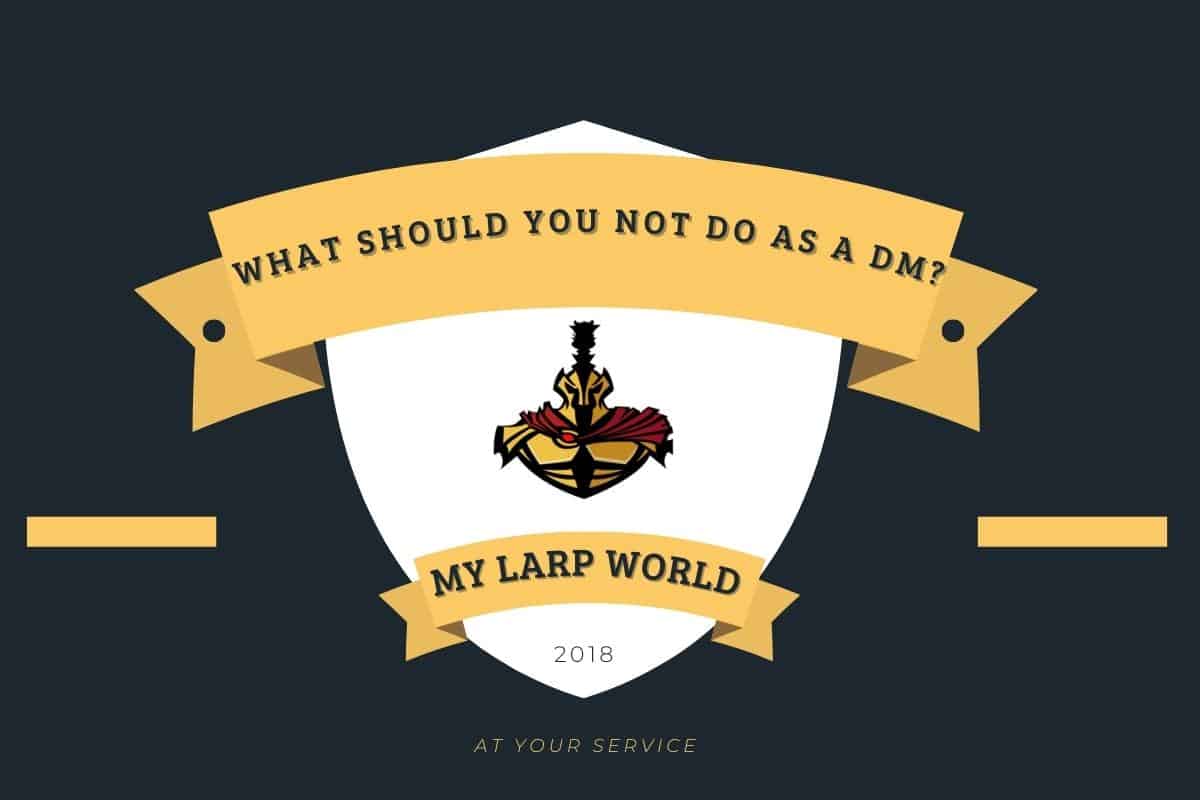DMs play a very important role in Dungeons and Dragons, and there are many ways to perform the role successfully. However, there are also a lot of things DMs can do that aren’t to anyone’s benefit.
These things aren’t always easy to spot or conclude logically. Most likely, mistakes will happen as you play, and the goal is to learn from them. However, being aware of stuff to avoid as a DM from the start will help you decrease the frequency of such mistakes.
That’s why I’ve listed the 12 most important things to not do as a DM. This way, you can know these things in advance and therefore stop them from happening.
1. Neglect Resources (You Won’t Remember Every Rule)
Resources, whether they are free online resources or a copy of some of the core material in DnD (for example the PHB, MM, or DMG), it’s highly advised to consult them when you don’t know what to do.
You’re not going to remember every rule since there are so many of them in the game. I would even wager that it isn’t possible to remember all of the rules.
Instead, consult your core material when you need to, and refrain from making stuff up on the go. This can create unwanted future precedents.
Of course, you don’t want to have to constantly read rules when playing DnD as this stops the flow of the game, but the frequency of such pauses will go down as you play more.
2. Make Obstacles Too Hard to Overcome
Another thing to avoid is making obstacles, such as monsters, too hard to fight and too difficult to avoid entirely. Of course, you can make an encounter very hard, hard enough that the party can wipe and die, but they still have to have a fighting chance.
Dying to a ridiculous boss monster that you can’t escape or fight doesn’t feel very good. One thing to note is that you can make a ridiculously big and powerful monster that is impossible to fight, but create hints so players understand that they have to be creative in avoiding the encounter rather than fighting it.
3. Let Players Jump Headfirst Into Danger
Players sometimes like to act first and think later, which can be a problem under certain circumstances. Of course, they can do this if they choose to, but your job is to make them aware of the risks of doing so.
Even if they’re doing an obviously dumb thing, make sure you share with them the possible outcomes of their actions. For example, some DMs like to share ballpark success rates for various stunts.
This can help prevent tensions with DMs and players, and provide an overall better understanding of what risks lie ahead.
4. Remove Player Agency
This is also sometimes referred to as “railroading”. Don’t be a dictator just because you can. In practice, this means that you shouldn’t force choices on players.
They have created characters that they want to control, and DMs forcing decisions too much and removing PC’s influences on decisions can create an unfun dynamic in the group.
Some DMs, for example, roll all dice behind a screen. Dice rolling is, for a lot of players, a very important aspect of controlling their character, and taking this away from players can make them feel like they’re not participating in the game anymore.
5. Take the Player’s Resources to Support Story
Some DMs use the player’s resources such as gear to further develop the story. The general recommendation here is to not do that if you’re not a very experienced DM.
Why? Well, most players want to use the gear that they have looted and won throughout the adventure. Sure, DMs use it to create a more interesting plot, and players most often get the gear back, but taking resources in the first place will create a situation that we talked about in tip number 4.
Taking resources can make players feel left out of the decision-making, they want to have a hand in what happens with their stuff, which is only natural.
I also recommend seeing the players themselves as resources, which means you shouldn’t forcibly take control of the PC without giving them a choice in the matter. I mention this because some DMs like to create scenarios where players are captured and so forth.
6. Restrict Player Freedom
This point connects with tip number 5 quite a bit if we see the player as something that you shouldn’t take control of without options or alternatives.
Above all, however, this point is about letting players make their choices. Of course, this doesn’t mean that you should let them run in and die, but don’t be too restrictive.
As I mentioned before, some DMs like to check an extra time if a player really wants to do something. Some people do this by telling the players what sort of risk of failure they’re dealing with, and others just ask control questions (“Are you sure you want to do this?”)
DMs almost always build scenarios to end up in a certain way, but don’t be annoyed or discouraged if players choose paths that you had not thought of. The best thing about DnD is the possibility to do whatever you want, and you don’t want to restrict that too much by forcing players in a certain direction.
7. Make the Rules Ambiguous
Dungeons and Dragons have a lot of rules, and they’re for the most part quite clear. However, a lot of groups have so-called house rules, where you adjust or make up some rules because your group wants to play a certain way.
Now, that’s fine, but make sure that everyone is clear on these rules from the get-go. If the rules are unclear, it can be easy to create a situation where players feel mistreated or unhappy with the game.
The same goes for changing any of the current rules. Make sure that everyone is aware of what you intend to do, and have a discussion about it.
8. Overdo Unimportant Lore
The narrative aspect of DnD is also very important, and it’s good when DMs are really into it. However, all narrative points aren’t equally important. That’s why you as a DM should be careful where you put the emphasis.
For example, if someone gets hit in combat, you don’t really have to go on a minute-long monologue about how it looked and how players reacted. Instead, save the really detailed narrative points for the important stuff.
This way, the important plot points come across as genuine and special. Of course, this doesn’t mean that you can’t have a fairly detailed narrative during combat. Just moderate it.
9. Superhero DMPC
Another thing that players get annoyed at is when their party is accompanied by an NPC that the DM controls (a “DMPC”), and it ends up being the leader or focal point of the entire party.
The DM is not a player, and the NPC should take a backseat. It’s fine for the NPC to have a personality, of course, but just make sure that it isn’t some sort of superhero which takes all of the sunshine from the players.
10. Roll Dice Behind the DM Screen
This isn’t something that you strictly shouldn’t do but decide with your party before playing, whether or not you’re going to roll dice in secret behind a DM screen, or in the open for everyone to see.
Players like to have agency within the game as we discussed previously, and rolling behind a screen can make them feel like they’re being cheated and that they don’t have any say.
Of course, there are some positives with rolling behind a screen as well. For example, you can make changes on the go, or give players leeway without them knowing it. However, most DMs don’t like to do this in my experience.
11. Let Players Create Unfitting Characters
To avoid annoyances in the game, make sure that characters are created with equal value. This doesn’t mean that they have to be boring or cookie-cutter, but having one person stand out too much can break the balance.
Furthermore, it can break the flavor of the group. There are a lot of options to select a character from, and you can always create characters that do well together. Plus, some players might get annoyed with one player taking all the spotlight with a ridiculous backstory or something along those lines.
12. Stop Smart Solutions
I mentioned this briefly before, but try to let the game flow naturally. Don’t be too linear in where you let the story take place, and don’t stop smart solutions to tricky problems.
It’s understandable that DMs want things to go a certain way when they have spent time on designing an encounter, but players are going to find ways around it, so try to go with the flow instead of stopping them.
Chances are that stopping good puzzle-solving skills is going to lead to annoyance from the players, and we want to create a setting where we can enjoy the game for a long time. Remember, a lot of DnD campaigns and adventures are quite lengthy, so getting along is pivotal.

